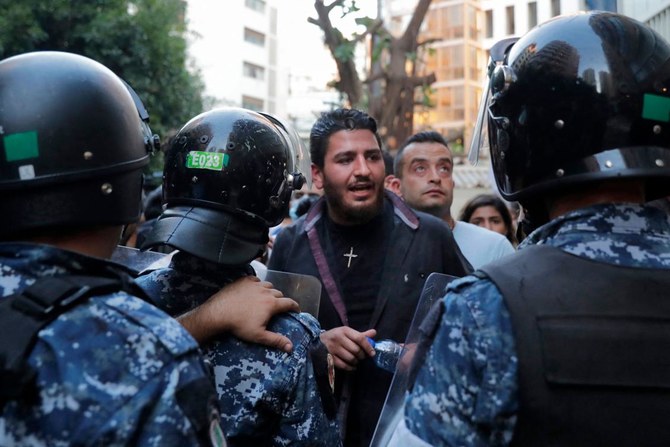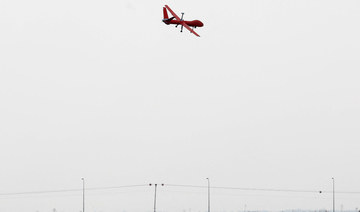BEIRUT: Families of victims of the Beirut port explosion blocked roads in Beirut and Jbeil on Saturday in protest at the arrest of their spokesman, William Noun, by Lebanon’s national security agency.
Pressure by protesters, politicians and activists led to his release after 24 hours in detention.
Noun was arrested after a televised statement last Thursday in which he expressed indignation at the obstruction of the investigation into the port explosion in 2020 that claimed the life of his brother Joe, a fireman.
The massive blast, triggered when a large amount of ammonium nitrate stored in a warehouse exploded, caused at least 218 deaths and up to $15 billion in property damage.
In his statement, Noun criticized an attempt to appoint a substitute judge for investigator Tarek Bitar, who was removed from the case a year ago, and threatened to “blow up the Justice Palace.”
His arrest was based on a judicial notice issued by Beirut Attorney General, Judge Zaher Hamadeh.
Noun’s house was also raided by state security personnel searching for explosive material.
A political observer told Arab News that Hamadeh has boasted of his ties with Hezbollah and the Amal Movement.
Hamadeh was a judicial investigator in the case of Imam Moussa Al-Sadr’s disappearance and has been touted as a possible replacement for Bitar in the port explosion probe, the observer said.
Neither the President of the Higher Judicial Council Souheil Abboud nor the General Prosecutor Ghassan Ouweidat attended a council meeting on Saturday.
In a statement, those present defended Hamadeh’s decision to arrest Noun, and condemned what they described as “an attack on the judge’s work and dignity.”
Families of the victims gathered in front of the state security headquarters, vowing to remain until Noun was released.
MP Melhem Khalaf, former president of the Bar Association, joined the protesters, saying that Noun’s comments “were the result of grief and that he didn’t actually mean it.”
Noun’s mother, who visited her son while he was in detention, said: “William is doing fine and is strong.”
She added tearfully: “Is this how they treat the parents who lost their children? I buried my first son and now my second son is detained. Why? Are we the ones responsible for the explosion? Are we the criminals? If the judges had lost their children, how would they have dealt with the case?”
Inhabitants of Jbeil, Noun’s birthplace, took to the streets on Friday to protest his detention.
Scuffles broke out between protesters and security forces personnel, who stepped in to open the roads.
Families of victims of the port explosion claimed Noun was “lured into a trap set by the corrupt and failing judiciary.”
His detention was an attempt to “scare and subjugate the martyrs’ families, in order to discourage them and undermine their determination to find out the truth,” they added.
Former prime minister Fouad Siniora described Noun’s detention as “an idiotic and shameful act.”
He called for the completion of investigation and the arrest of the “real criminals responsible for the port deaths.”
Elias Bou Saab, deputy speaker of parliament, described Noun’s detention “in this scandalous way as a questionable idiocy done for malicious purposes,” while former Labor minister Camille Abousleiman said the arrest was “a joke and an insolence.”
MP Bilal Abdallah said that “the state has turned into a police state in the case of the port explosion and the way the families of the victims are being treated.”
Samy Gemayel, head of the Kataeb party, said: “The fact that they are switching roles and turning the victims’ families into criminals means that we have reached the final chapters of the law of the jungle.”
The investigating judge in the Beirut port explosion case faced demands for his removal after he issued a series of subpoenas against politicians and security personnel.
Subpoenaed suspects, including deputies affiliated with the Amal Movement, refused to be questioned.
Hezbollah and the Amal Movement took to the street to protest Bitar’s decisions, which resulted in a bloody clash over a year ago that obstructed the investigation.













